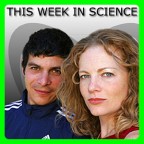Podcast: Play in new window | Download (Duration: 1:23:52 — 38.4MB)
Not So FTL, Scientist Comes Clean, Exercise Is good, Moon Volcanoes And Stretch Marks, Super-Earth Sauna, Mars Quakes, Old Earth, Storms Get Upgraded, Alex Lives, And Much More…
Disclaimer, Disclaimer, Disclaimer!!!
The following hour of programming is brought to you by Scientists everywhere who’s motto is…
Science! It’s what we do…
And by the fine folks who formulated your education who if they had a motto my go something like
Teaching you… is what we do.
And by the Universe… who’s motto we are still attempting to figure out even though it is written everywhere we look…
And by the collective consciences of carefully acquired knowledge over the ages, which would like to remind you that what you know… is all in your head.
Special contributions to todays show were provided by you the listening audience…
Without you, there would be no justifiable way for me to talk in this announcer voice…
Many more than mentioned had measurable impact on what lays ahead, but there’s no time to mention them now…
This week in science…
Coming up next.
Following the news…
Maybe not so FTL: It turns out that the “faster than light” neutrinos were not quite as speedy as previously recorded. A loose cable may have effected the atomic clock used to measure the neutrinos’ speed. However, there is still a chance that the results were accurate, so further experimentation, as always, will help tell the tale.
The source of the “leaked” documents from the Heartland Institute has been revealed. Peter Gleick, a hydrologist and climate analyst, has come forward, and most certainly sacrificed his career, in order to expose the Heartland Institute’s plan to inject climate change skepticism into our schools’ curricula.
C. albicans, a fungus, has figured out how to hitch a ride with host immune signaling molecules, so that it can navigate through and tolerate and active immune system. It can even “eavesdrop” on communication within the host’s immune system, so it knows when and where to settle.
Exercise and the brain: A new study out of Japan showed that exercise lowered stores of glycogen in the brain in rats. However, when they exercised on a regular basis for four weeks, food right after exercise went straight to their head. Brain carbo-loading… does regular exercise followed by a carb-rich snack improve your mental capacity?
Exercise and burnout: New research from the Tel Aviv University indicates that a regular exercise regimen improves mental health and prevents “burnout” at work.
Get a free audiobook at Audible.com!
Are you reading along with the TWIS Bookclub? This month, check out ‘A Planet of Viruses’ by Carl Zimmer
The same region of the brain that responds to textures when we physically touch things fires when we hear a metaphor that involves a textural description. Cool! Did I just do it?
Getting Moon-y:
Lunar vulcanism: There are moonquakes, but why no mooncanoes? Researchers used moon rocks from the Apollo 17 landing to create synthetic moon rocks, and exposed them to tremendous temperature and pressure, as well as x-ray beams. On Earth, magma is lighter than the dense surface, so it bubbles out. However, on the moon, the titanium in the magma makes it sink down to the core, preventing volcanic activity. Perhaps, someday. A girl can dream…
Recent activity: Scratches on the moon’s surface indicates stretching, in opposition to contractile forces. Lots appears to still be going on under those craters.
Planets get steamy… Scientists found a super-earth sauna under a red-dwarf sun. Do I smell a new tourist spot?
All shook up… Is an earthquake on Mars still called an “earth”quake? Boulder tracks visible on Mars indicate an earthquake within the last million years or so, at about 7.0 magnitude. This would imply volcanoes, which would in turn indicate the presence of water.
And, collided: Some volcanic rock in Russia millions of years old indicates that the mantle has changed and churned over the years, but never completely homogenized. Sections of the mantle remained unchanged through massive collisions, including the one that formed the Moon.
There may be 100,000 times more nomad planets than stars in our galaxy. You can’t help but wonder then, if our planet wandered into the Sun’s orbit from a nomad state in the milky way?
Storm Gets Upgraded
And, volcanoes aren’t that bad
Alex the Parrot lives on… Animal Cognition recently published the results of some experiments done with Alex before he passed on in 2007. Alex was inadvertently taught how to add numbers. He recognized Arabic numerals and was able to order them, add them, and equate them to the appropriate number of objects. Now that’s a bird brain!
If you love TWIS, please support us by donating below:



I’ve still got all my money on the quick muons.
I think you mean “superluminal muon-neutrinos”.
So, how much money?
I wanna get in on this action!
I really enjoyed the “pop quiz” Monty Hall problem.
Yes, Kirsten, there is a Quantum mechanical version of this game! 🙂
http://en.wikipedia.org/wiki/Monty_Hall_problem#Quantum_version
What if the Earth, a rogue planet, somehow showed up between Venus and Mars?
The Earth, Venus, and Mars were all born from the same Protoplanetary disc.
Earth can no more be a captured rogue planet than can Venus be a commet ejected from Jupiter.
1. The inner planets have nearly circular orbits, around roughly the same plane.
This is not expected for a captured rogue planet.
2. The inner planets are made of the same stuff (rock, nickel, iron).
The chances are slim that a rogue planet would have fit in so well.
3. The ratios of isotopes among the inner planets are largely the same.
Small deviations in the ratios of isotopes are like a fingerprint.
These give us clues to the solar system’s formation:
http://www.universetoday.com/89519/best-evidence-yet-that-comets-delivered-water-for-earths-oceans/
http://www.cosmosmagazine.com/news/4347/meteorites-reveal-how-mars-had-a-growth-spurt
http://www.mendeley.com/research/iron-isotope-differences-between-earth-moon-mars-and-vesta-as-possible-records-of-contrasted-accretion-mechanisms/
Earth shares its isotope fingerprint with the inner planets, so it shares their birth place, too.
Hey, do you have a breakout link to the story from “Brain and Language”? about the brain touch portion of the brain triggering from analogies and metaphors?
On your global warming ice-caps topic today.
In my fluid dynamics class, our Professor has pointed out a common misunderstanding about global warming and ice melting. Any sort of floating object (like an iceburg) displaces it’s own weight in water, so ice in the water will displace the same volume independent of whether it is in solid or liquid form.
This isn’t a global warming denier type of comment … but just a note for everybody to remember their physics. It will only be the melting of the ice that’s on land that will contribute to rising sea levels. I’d be curious how much of the ice available for melting due to global warming is ice on land or ice in the water, so that one could put a bound on the possible error of sea-level rise estimates when they don’t include the details of how exactly the estimate was made (assuming that some of these estimates have also incorrectly included ice in the water).
Peeter,
Yes, sea level rise models take displacement into account because, as you say, it’s basic physics.
For example, IPCC 4 estimates a sea levels rise of 13~20 feet from melting of above sea level ice in Greenland and the Antarctic.
http://en.wikipedia.org/wiki/Current_sea_level_rise#Future_sea_level_rise